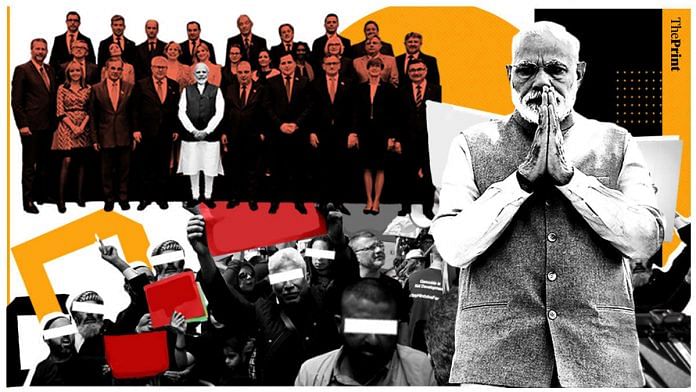Twenty-seven European Union MPs are in Jammu and Kashmir, of which 22 are of the far-right ideology. This is the first international delegation to visit the Valley after the Narendra Modi government diluted the special powers for the state on 5 August. The move and the subsequent clampdown were opposed by several liberal politicians in the West. Tuesday’s EU visit was also criticised because India’s own opposition parties have been denied permission to visit.
ThePrint asks: Modi govt allows mostly far-Right EU MPs to J&K: Smart diplomacy to counter Western liberals?
One may call the EU MPs far-Right, but it’s not all that they are

Abhijit Iyer Mitra
Senior fellow, Institute of Peace and Conflict Studies
We shouldn’t get bogged down in the political orientation of the European MEPs in Kashmir. It is very easy to describe them only as far-Right when, in fact, they are extremely hard on law and order. And that is what matters. One may call them far-Right, but it’s not all that they are.
The EU delegation includes MEPs from France, such as Thierri Mariani, who was part of the François Fillon III government, which was not far-Right by any stretch of the imagination. You can’t just take somebody there and give them a curated trip. We may show them what we want to portray, but they will see what they want to see.
It is important to note that the Indian far-Right is different from the European far right. The point here is that these are friends of India. Taking them to Kashmir can go one of two ways. However, we shouldn’t see it from an ideological perspective.
PM Modi isn’t internationalising the Kashmir issue, but is definitely trying to combat any negativity, which is his job. The government will be showcasing the Valley via a law and order approach, and not as a sob story.
The liberals will react more vehemently. You can’t have the far-Right defend Indian position on Kashmir
 Khalid Shah
Khalid Shah
Associate Fellow, Observer Research Foundation
I don’t think this is smart diplomacy. The government can’t allow its position on Kashmir to be represented only by the far-Right politicians of European Union. This will not only rile up the liberals, but also the conservatives. Giving this position to the far-Right won’t work in India’s national interest.
The liberals will start reacting more vehemently. If it’s meant to counter the Western liberals, you can’t have the far-Right defending the Indian position on Kashmir. Once it becomes a partisan issue between the Right, the liberals and the left, it will get more global attention on Kashmir and that is not what the Indian government wants.
In the past, we have had bipartisan consensus on Kashmir. What has changed now is that an increasing number of liberals are questioning the government of India on human rights. The government needs to engage with them and convince them of its position.
These far-Right parties are considered racist, not just against Muslims but also against people of colour. India is playing on a very slippery slope here. This move is signalling that only the far right is in favour of India’s position on Kashmir. There is a risk that the discourse on Kashmir will become more polarised in domestic politics in European countries. That’s not how it should be.
This will not only draw flak from the liberals and Left-leaning sections of the press and civil society but also the Indian diaspora which is on the receiving end of the anti-immigrant stand of the far-Right.
Also read: How EU lawmakers’ Kashmir visit, Modi’s Saudi trip & Ayodhya verdict are all linked
The opinion of Western liberals or conservatives is inconsequential for the J&K situation at this point
 Pranay Kotasthane
Pranay Kotasthane
Head of Research, Takshashila Institution
The Indian government has lost the plot if this unofficial trip is being held to ‘counter Western liberals’. The opinion of Western liberals or conservatives is inconsequential for the situation in J&K at this point.
The fact remains that the situation there is not normal. It is in a volatile security situation abetted by Pakistan, exacerbated by the absence of legitimate political channels, prolonged restrictions on communications, a weak economic infrastructure, and an inadequate administrative capacity. The real challenge before the government then is to manage this security situation while rebooting the economic and political mechanisms quickly. Even a favourable report by this MEP delegation will have zero impact towards solving this challenge. In fact, it will lead to rounds of trips and counter-trips, needless distractions given the delicate and tense situation on the ground.
Even from a moral standpoint, this visit is problematic as Indian politicians have been disallowed from visiting the valley. Several local politicians still remain under detention.
Hence, the visit is unlikely to change the perception domestically or internationally. Moreover, it goes against the long-held Indian position that political developments in J&K are an internal matter of the Republic of India.
India should use those empathetic to its point of view to counter the vicious propaganda on Kashmir
 Kanwal Sibal
Kanwal Sibal
Former foreign secretary and executive council member at VIF
There has been a right-wing nationalist shift in European politics that is reflected in the composition of the European Parliament today. India has not engineered this shift, but India can take advantage of it. Why should we show disrespect to democratically elected MPs of a particular orientation who represent more closely the views of their electorate by labelling them as far-Right MPs? Why is that worse than far Left or ultra-liberal MPs?
We should see who are more empathetic to our point of view and use them to counter the utterly vicious propaganda against us by pro-Islamic, pro-Pakistan, and highly prejudiced circles, as we saw in the recent US Congressional hearings.
We have to reach out to the liberals too because they too are part of the political landscape. Whether we succeed is another matter.
The New York Times, The Washington Post, The Guardian, the Independent, the Economist will not change their thinking as they are riven with deep-seated biases against India, nor will the likes of Ilhan Omar, the unabashed pro-Islamic US Congresswoman and some liberal circles of Indian origin in the US.
We have a challenge before us. We have to fight on all fronts.
Also read: World won’t buy Modi’s high-profile diplomacy if he sends far-Right EU members to Kashmir
By Taran Deol, journalist at ThePrint




If we believe that the New York Times, Washington Post, The Economist, Guardian, Independent – why not add BBC, CNN, The Times to complete the list – are riven with deep seated biases against India, we are getting a little paranoid. These are authoritative voices that decision makers trust. Not Russia Today and Global Times. It acknowledges how far the India story has unravelled from spring in 2014. Deep winter now. Nor will “ cultivating high level sources “ help.
You seem to be reading a lot of foreign stuff these days? Kabhi Sri Lanka chi Gaye ho ya sirf badi badi hankte ho?
“PM Modi isn’t internationalising the Kashmir issue, but is definitely trying to combat any negativity, which is his job.” – Of course Modi wouldn’t internationalise the Kashmir issue after repeatedly saying the issue was an “internal matter”.
Modi’s job may be to fight negativity, but he has to do it with truth. American senator Van Hollen wan’t recently allowed to visit Kashmir valley. Why? And an invitation to Chris Davies, a member of the European parliament (MEP) from the UK, who insisted on moving in the Valley unaccompanied by by military, police or security forces, was withdrawn! WHY?
Any opening up of the Kashmir Valley, even if selectively, to individuals of a certain philosophy, is welcome. It is bound to lead to more visits by more representative groups, in a less constrained framework. 2. As far as global acceptance of the official version is concerned, that is an infinitely more complex issue. There are many paths that lead to the truth. Responsible people will make the effort to gain a deeper understanding of the true situation.